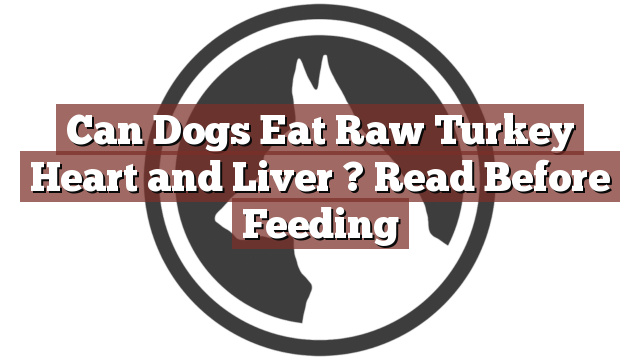Understanding Your Dog’s Dietary Needs
As a responsible dog owner, it’s essential to understand your furry friend’s dietary needs to ensure their overall health and well-being. Dogs are natural carnivores, and their diet should primarily consist of meat. While commercial dog food provides a balanced diet, many pet owners are exploring alternative options, such as feeding their dogs raw food. Before making any changes to your dog’s diet, it’s crucial to gather all the necessary information to make an informed decision.
Can Dogs Eat Raw Turkey Heart and Liver? Read Before Feeding
Can dogs eat raw turkey heart and liver? The answer is yes, dogs can eat raw turkey heart and liver. In fact, these organs are highly nutritious for dogs and can be a valuable addition to their diet. Raw turkey heart is an excellent source of protein, vitamins, and minerals, including iron, zinc, and B vitamins. The heart is also low in fat, making it a healthy choice for your canine companion. Similarly, raw turkey liver is rich in vitamin A, as well as other essential vitamins and minerals.
Pros and Cons of Feeding Raw Turkey Heart and Liver to Dogs
Feeding raw turkey heart and liver to dogs comes with its own set of pros and cons. On the positive side, these organs provide a natural source of nutrients that can improve your dog’s overall health. The high protein content in the heart supports muscle development and repair, while the liver’s vitamin-rich composition assists in maintaining healthy eyes, skin, and coat. Additionally, raw food enthusiasts claim that feeding their dogs a raw diet can lead to benefits such as increased energy levels and improved digestion.
However, it’s important to consider potential drawbacks as well. Raw meat, including turkey heart and liver, can carry harmful bacteria, such as Salmonella or E. coli, that can cause foodborne illnesses in both dogs and humans. It is crucial to handle raw meat safely, ensuring that it is stored properly and not cross-contaminating any surfaces. Another aspect to consider is the risk of an imbalanced diet. While turkey heart and liver offer many nutrients, they should not make up the entirety of your dog’s diet. Proper balance can be achieved by consulting with a veterinarian or a canine nutritionist.
Conclusion: Considerations and Recommendations for Feeding Raw Turkey Heart and Liver to Dogs
In conclusion, dogs can eat raw turkey heart and liver, and these organs can provide valuable nutrition. However, it’s essential to take certain precautions to ensure your dog’s safety and well-being. Raw meat should be handled with care, and proper hygiene practices should be followed to minimize the risk of foodborne illnesses. Additionally, it’s crucial to balance your dog’s diet by incorporating other sources of nutrients and consulting with professionals who can guide you on the best feeding practices for your specific dog.
Feeding your dog a raw diet can be a personal choice, but it’s important to base your decision on thorough research and understanding of your dog’s individual needs. By doing so, you can ensure that your furry friend receives a balanced and nutritious diet that promotes their overall health and happiness.
Thank you for taking the time to read through our exploration of [page_title]. As every dog lover knows, our furry friends have unique dietary needs and responses, often varying from one canine to another. This is why it's paramount to approach any changes in their diet with caution and knowledge.
Before introducing any new treats or making alterations to your dog's diet based on our insights, it's crucial to consult with a veterinarian about [page_title]. Their expertise ensures that the choices you make are well-suited to your particular pet's health and well-being.
Even seemingly harmless foods can sometimes lead to allergic reactions or digestive issues, which is why monitoring your dog after introducing any new food item is essential.
The content provided here on [page_title] is crafted with care, thorough research, and a genuine love for dogs. Nevertheless, it serves as a general guideline and should not be considered a substitute for professional veterinary advice.
Always prioritize the expert insights of your veterinarian, and remember that the health and happiness of your furry companion come first.
May your journey with your pet continue to be filled with joy, love, and safe culinary adventures. Happy reading, and even happier snacking for your canine friend!

